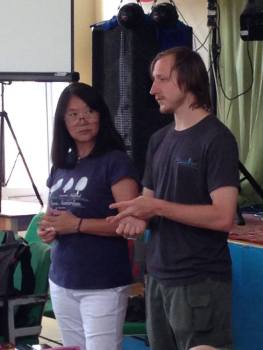“They may know some of the Bible stories, but what they don’t have is the, ‘So what? So you know the story about Noah, you know the story about Jonah. What’s the implication? What does it mean to your daily life? When we read this in the scripture, what does it mean about how we should live life differently?’” Team Agape Leader Geoff Casella said. “There’s a real mixture of backgrounds, but all of them, I think, can come together on those deeper questions.”
Through 12 summers as Team Agape has attended Camp Smerichka in Western Ukraine, teaching spiritual and ethical character and giving away Bibles, God continues manifesting His work in fresh ways. According to Geoff, this summer was the first trip taken where everyone on the team had previous experience to rely on. And this year’s trip dug to new depths of what it means to embody the virtues of God.
* * *
Connor Hoell stood in front of a group of older campers, Alina Shin next to him as his Ukrainian teaching partner and interpreter. They had introduced the topic of responsibility, but there was still a deeper understanding to be grasped.

“Whose responsibility is it to take care of the orphans?” Connor posed. Alina interpreted.
“Oh, well, that’s the government’s job,” came a response from the campers.
“Does the government do this?” Again, Alina interpreted.
A chorus of dissatisfied “no” responses came back.
“Well, who takes care of them then?”
Connor said his purpose in teaching responsibility in this way was to expand the concept of family and who all our responsibility should be for.
“They are very willing to help a family member. They are very family oriented, so if you can expand their idea of family to people in their community, compassion becomes mentally possible.”
* * *
When Matthew Dowell, ventured on a hike with a group of campers, he brought two bags with him to pick up trash found on the way up and the return journey. His intent, having shared with the group the Boy Scouts’ rule to always leave a place better than you found it, was to first demonstrate it and have the campers participate on the way back down. This example seemed to resonate well as the campers began participating.
“Two of my group actually came up and thanked him for that,” Jessica Dowell said.
This same exercise for a deeper-principled lifestyle was repeated with the group Connor went with on an overnight hike later on.
“After I made all of my kids pick up trash on the mountain, one of my kids picked up all the way back to camp,” Connor said.
* * *
Dima Shemanyuk, long-time Ukrainian team member, who this year got to work with a lot of campers he’s worked with in previous years, said he enjoyed seeing how much more responsive his campers had become.
“I am not talking about response in words, but more response that you can see in their eyes when they listen you,” Dima said. “Every single time you go there, you are building a relationship with them, and if you want them to accept your lessons, first you need to become a person they can trust.”
One indicator of those deeper connections being built is communication in the language of the hearer, and campers have occasionally used sharing at the Goodbye Ceremony to do so. This year, Anthea Hoell (under the tutelage of our fifth time interpreter, Arseniy Mizhenskiy) presented her farewell speech in the Ukrainian language.
“There was a lot of excitement that came from the speech,” Anthea said. “They really like it when we speak their language.”
* * *
Special report about the market by Geoff Casella:
“On “Market Day” in the village, we also gave about 200 bible bundles to the locals outside of camp. People would wait in the hot sun for more Bibles to show up. This is the first year one of the counselors assisted in distribution of Bibles in the market. It was very much appreciated since hauling the books from camp can be physically trying for me. We were welcomed at the market by people who remembered us from last year. Each year we set up in front of a grain truck. They cleared a spot for us and insisted we operate from there, even though it probably distracted from the business they could otherwise do. The hardest part of giving away Bibles in the market is convincing people they are free. As we did so, however, we had Ukrainians telling others what we had to offer. One elderly man clearly wanted the books but offered me a 50 Hrivna note for them because he didn’t want to owe anyone anything. That amounts to about $2 and wouldn’t come close to the value but many people will work a whole month for the value of these books in their current economy. I was tempted to take the money since it was really important to him. However, I told him instead that if it was important to him, he could donate it to the wounded soldier relief fund that was raising money around the corner (in any case, I didn’t pay for the printing of these books – that was from EEM; my interpreter wisely advised him of this and said “You cannot pay him for this, it will offend him” – this was something Ukrainians understood).”
Interested in reading more about the Market Day ministry? Read how it started in: “It Started With…“